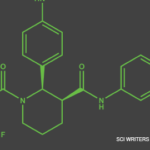In broadly discussing options for remission maintenance in patients who have achieved remission with rituximab as the induction agent, Dr. Merkel explained that rituximab 500 mg IV once every four to six months may be the most appropriate option for most patients. Methotrexate and azathioprine remain as potential alternatives, but trials like MAINRITSAN-1 and RITAZAREM should lead to caution with these medications given the increased risk of relapse.
Patients can be further stratified into high- and low-risk categories, and the finding that patients with new-onset, anti-myeloperoxidase antibody positive ANCA-associated vasculitis are at lower risk of relapse than those with other subtypes of ANCA-associated vasculitis indicates that a watch-and-wait approach after one course of rituximab or 18 months of cyclophosphamide followed by azathioprine may be appropriate in these patients.
Dr. Merkel noted that issues that may affect decisions on maintenance agents include cost, risks of infection associated with long-term treatment, and when and how to use low-dose glucocorticoids as part of remission maintenance.
Plasma Exchange
Dr. Merkel next talked about the PEXIVAS trial, for which he was also a co-primary investigator.4 Rates of end-stage renal disease (ESRD) and mortality continue to be high in ANCA-associated vasculitis, and plasma exchange has often been used in severely ill patients. Thus, PEXIVAS researchers sought to answer these questions: Does plasma exchange reduce death from any cause or ESRD? Is a reduced-dose oral glucocorticoid regimen non-inferior to a standard dose regimen in terms of death from any cause or ESRD, and is it superior in regard to serious infections?
In this randomized, controlled trial, Dr. Merkel et al. found no difference in mortality or ESRD rates in the group of patients that received plasma exchange and those who did not receive plasma exchange. Further, reduced-dose glucocorticoids were non-inferior to the standard-dose regimen in the primary and all secondary outcome measures, and 31% fewer serious infections occurred in the reduced-dose group than in the standard-dose group.
This second conclusion, and the results of other studies, such as the LoVAS trial, have created excitement about the potential for greatly reduced steroid doses in the treatment of many patients with ANCA-associated vasculitis.5
Avacopan
Adding to this excitement is the ADVOCATE trial, which looked at the C5a receptor inhibitor avacopan and compared this treatment to prednisone in patients with ANCA-associated vasculitis who were being treated with rituximab or cyclophosphamide/azathioprine. In this study, avacopan was found to reduce glucocorticoid use and toxicity by reducing the need for extended daily glucocorticoid therapy; it was also found to improve disease control and recovery of renal function.6

